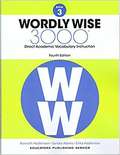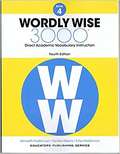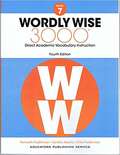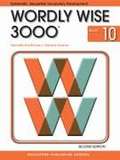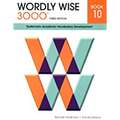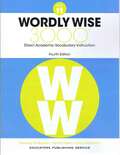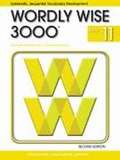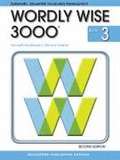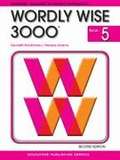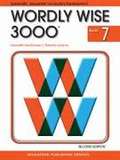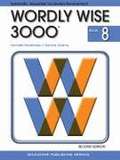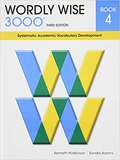- Table View
- List View
Word Wizards (Fountas & Pinnell LLI Purple #Level R)
by Sarah BrockettWhat word can you spell from the letters B, A, B, L, S, C, E, and R? Here's a hint: it's a game played in millions of homes around the world. It's also a fierce battle among some of the most brilliant minds on the planet.
Wordly Wise 3000 Direct Academic Vocabulary Instruction Book 5 (Fourth Edition)
by Kenneth Hodkinson Sandra Adams Erika HodkinsonWordly Wise 3000, 4th Edition, Book 5 contains 20 lessons with 15 words per lesson and focuses on preparing students to be able to decipher words they'll encounter in content area texts, literature, and tests. Lessons begin with word lists that include definitions with contextual sentences, much like dictionary entries; a selection of activities follow the word list, which may include matching words and definitions, matching synonyms and antonyms, identifying whether words were used correctly in a particular context, sentence completions, reading passages followed by comprehension questions, discussion/writing extension ideas, and other exercises.
Wordly Wise 3000 Direct Academic Vocabulary Instruction Book 6 (Fourth Edition)
by Kenneth Hodkinson Sandra Adams Erika HodkinsonBuild vocabulary along with reading, writing, and critical thinking skills with Wordly Wise 3000! Wordly Wise 3000, 4th Edition, Book 6 contains 20 lessons with 15 words per lesson and focuses on preparing students to be able to decipher words they'll encounter in content area texts, literature, and tests. Lessons begin with word lists that include definitions with contextual sentences, much like dictionary entries; a selection of activities follow the word list, which may include matching words and definitions, matching synonyms and antonyms, identifying whether words were used correctly in a particular context, sentence completions, reading passages followed by comprehension questions, discussion/writing extension ideas, and other exercises .
Wordly Wise 3000 Direct Academic Vocabulary Instruction Book 8 (Fourth Edition)
by Kenneth Hodkinson Sandra Adams Erika HodkinsonWordly Wise 3000, 4th Edition, Book 8 contains 20 lessons with 15 words per lesson and focuses on preparing students to be able to decipher words they'll encounter in content area texts, literature, and tests. Lessons begin with word lists that include definitions with contextual sentences, much like dictionary entries; a selection of activities follow the word list, which include replacing a phrase with a word from the list that means the same thing, identifying the correct definition, choosing the best word to complete a sentence, identifying synonyms, reading passages followed by comprehension questions, discussion/writing extension ideas, and other exercises.
Wordly Wise 3000 (Direct Academic Vocabulary Instruction #1)
by Cheryl DresserNIMAC-sourced textbook
Wordly Wise 3000 (Direct Academic Vocabulary Instruction #3)
by Kenneth Hodkinson Sandra Adams Erika HodkinsonNIMAC-sourced textbook
Wordly Wise 3000 (Direct Academic Vocabulary Instruction #4)
by Kenneth Hodkinson Sandra Adams Erika HodkinsonNIMAC-sourced textbook
Wordly Wise 3000 (Direct Academic Vocabulary Instruction #7)
by Kenneth Hodkinson Sandra Adams Erika HodkinsonNIMAC-sourced textbook
Wordly Wise 3000 (Direct Academic Vocabulary Instruction #K)
by Cheryl DresserNIMAC-sourced textbook
Wordly Wise 3000 Book 10
by Kenneth Hodkinson Sandra AdamsWords from literature, textbooks, and the SAT--words most likely to appear on high-stakes tests. Student books include 150 words per level in books 2-3 and 300 new words per level in books 4-12.
Wordly Wise 3000 Book 10: Systematic Academic Vocabulary Development
by Kenneth Hodkinson Sandra Adams<P>Obviously, it's important to know what words mean.<P> Your studies so far in school have proven that time and time again. <P>We might be tempted to skip words we don't know--particularly difficult words--when we see them in textbooks.<P> But this affects how well we understand what we read.
Wordly Wise 3000 Book 11 [Workbook] (2nd Edition)
by Kenneth Hodkinson Sandra AdamsWords from literature, textbooks, and the SAT--words most likely to appear on high-stakes tests. Student books include 150 words per level in books 2-3 and 300 new words per level in books 4-12.
Wordly Wise 3000 Book 3 [Workbook]
by Kenneth Hodkinson Sandra AdamsWords from literature, textbooks, and the SAT--words most likely to appear on high-stakes tests. Student books include 150 words per level in books 2-3 and 300 new words per level in books 4-12.
Wordly Wise 3000 Book 5 [Workbook]
by Kenneth Hodkinson Sandra AdamsWords from literature, textbooks, and the SAT--words most likely to appear on high-stakes tests. Student books include 150 words per level in books 2-3 and 300 new words per level in books 4-12.
Wordly Wise 3000 Book 5: Systematic Academic Vocabulary Development (Third Edition)
by Kenneth Hodkinson Sandra AdamsWordly Wise 3000, Book 5 is made up of 20 lessons with 15 words in each lesson. In Book 5, vocabulary instruction is increasingly sophisticated, while continuing to prepare students for content area learning; lessons focus on building vocabulary while strengthening reading, writing, and critical thinking skills.
Wordly Wise 3000 Book 7: Systematic Academic Vocalulary Development
by Kenneth Hodkinson Sandra AdamsWordly Wise 3000 will help you learn a lot of words, but it can't teach you all the words you'll ever need. It can, however, help guide your learning of new words on your own.
Wordly Wise 3000 Book 8 [Workbook]
by Kenneth Hodkinson Sandra AdamsWords from literature, textbooks, and the SAT--words most likely to appear on high-stakes tests. Student books include 150 words per level in books 2-3 and 300 new words per level in books 4-12.
Wordly Wise 3000 Student Book 9 (3rd Edition)
by Kenneth Hodkinson Sandra AdamsWordly Wise has been popular with educators for over 30 years, Students acquire important skills, such as using a glossary and dictionary. Activities and word games appear in each lesson to reinforce new words.
Wordly Wise 3000: Book 6
by Kenneth Hodkinson Sandra AdamsA solid vocabulary is crucial for testing, writing, and the precise communication required by daily life. Using a contextual approach, Wordly Wise 3000 students are taught to say unfamiliar words and identify any possible similarities to other words, use the word in context, break the word down into parts, and finally look it up. Three thousand carefully selected words taken from literature, textbooks, and SAT-prep books form the backbone of this vocabulary series. Each lesson begins with a Word List that includes pronunciations, parts of speech, and concise definitions, and uses each word in an interesting, contextual, sentence.
Wordly Wise 3000: Systematic Academic Vocabulary Development
by Kenneth Hodkinson Sandra AdamsA solid vocabulary is crucial for testing, writing, and the precise communication required by daily life. Wordly Wise 3000 students are taught to say unfamiliar words and identify any possible similarities to other words, use the word in context, break the word down into parts, and finally look it up.
Wordly Wise 3000: Systematic Academic Vocabulary Development (3rd Edition)
by Kenneth Hodkinson Sandra AdamsLearn vocabulary building blocks that will help you succeed in school.

